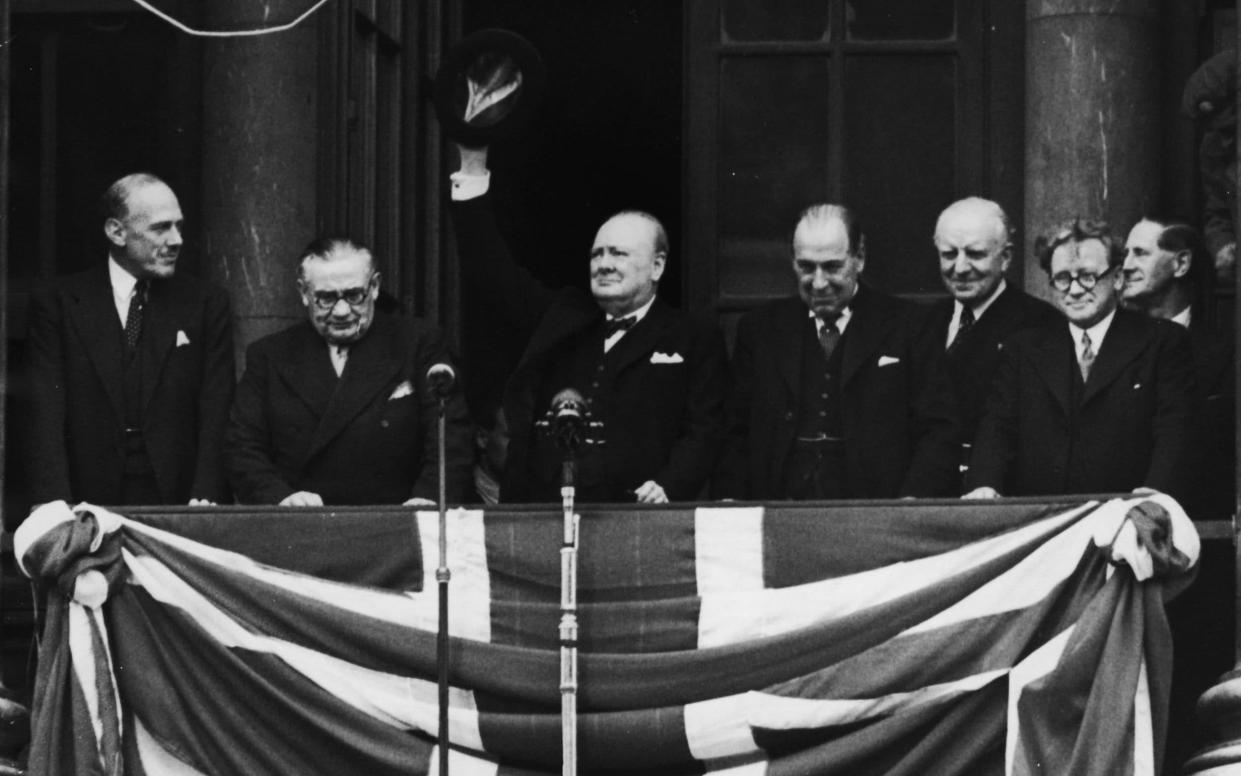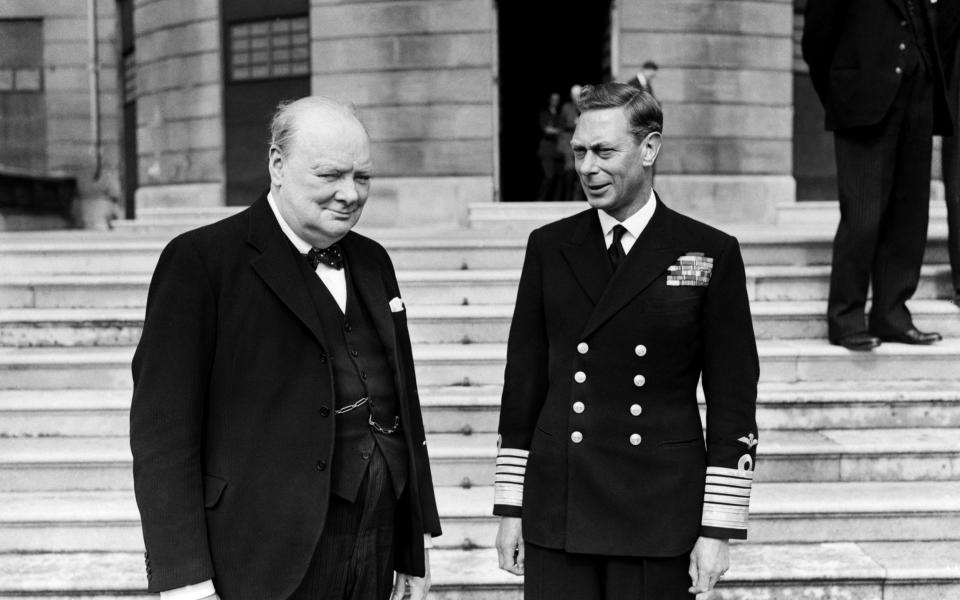'Advance, Britannia!' How Winston Churchill's speeches enraptured his nation on VE Day

When Winston Churchill woke up in No.10 Downing Street on Monday, 7 May 1945, Captain Richard Pim, the head of his map room, brought him the longed-for news: the unconditional surrender of German forces in Europe, which had been signed by Grand Admiral Doenitz and Major-General Alfred Jodl at 2.41am at General Eisenhower’s headquarters in Germany.
Churchill read the document, initialled it, and handed it back to Pim, teasing him that for three or four years he had brought him bad news, “but now he had redeemed himself by bringing the greatest and most welcome news of the war”.
It was decided between the American and British staffs that the following day would be designated “Victory in Europe Day” – and Churchill declared it a public holiday.
For the whole morning of Tuesday, 8 May, Churchill worked as usual in his bedroom, sitting up in bed dictating replies to telegrams and writing the speeches he was to deliver later. Once he had bathed and dressed, he went to Buckingham Palace for lunch with King George VI and Queen Elizabeth (later the Queen Mother).

Making his way through the crowded throng at No.10, where the corridors were lined with people determined to congratulate him, he spotted Georgina Landemere, his cook who had taken such good care of him during the war, who had come up from the kitchen to watch the festivities. Breaking away from his staff who were keen to get him to the Palace on time, Churchill went over to her and thanked her for her service.
“The PM came to lunch,” the King noted in his diary. “We congratulated each other on the end of the European War.” Churchill then returned to the Cabinet Room at Downing Street to make his broadcast to the Empire.
It was a sunny day, so he asked for the blinds to be drawn. His secretary Marian Davies, who had typed the speech, was allowed to watch him deliver it, and recalled “a terrific trumpet from the PM as he blew his nose” just before he began. On the dot of 3pm, Churchill started.

Large loudspeakers had been rigged up in central London to carry his words to the crowds of over a million people who had already gathered in the streets. He started formally, saying that hostilities would end officially at one minute after midnight, and that, “the German war is, therefore, at an end”.
The cheering in Trafalgar Square and Parliament Square could be heard in the Cabinet Room. He summed up the course of the war over the past six years and how, after Russia and America had entered the conflict in 1941, “finally, almost the whole world was combined against the evil-doers, who are now prostrate before us”.
Harold Nicolson MP, who was in Parliament Square listening to the speech, noted in his diary how “the crowd gasped” at that sentence. The full enormity of the moment only seemed to be slowly entering the consciousness of a people who had experienced such extremes of suffering and sacrifice. It had only been three months since the last flight of V-bombs fell on the United Kingdom, which had killed nearly three thousand Britons.
“We may allow ourselves a brief period of rejoicing,” Churchill continued, “but let us not forget for a moment the toil and efforts that lie ahead. Japan, with all her treachery and greed, remains unsubdued.”
He ended with the patriotic peroration: “Advance, Britannia! Long live the cause of freedom! God save the King!”
Marian Holmes noticed that his voice broke slightly with emotion as he spoke the last line. It was the apogee of Churchill’s career, and also a signal for the British people to celebrate in a way they never had even for any coronation or jubilee or victory, or even when they heard the news of the relief of Mafeking in the Boer War.
Churchill had difficulty getting to the House of Commons because of the huge crowds mobbing him. “When we got round to Parliament Square, we were soon surrounded by an immense, wildly excited crowd,” recalled John Martin, his private secretary.
“At one moment, I thought we would never get through. People clung to our car on every side and several clambered onto the roof, so that in photographs it is completely invisible.” Churchill’s parliamentary private secretary, Colonel George Harvie-Watt MP, who was also in the car, had a finger broken in the melee.
Nicolson was present when Churchill entered the Chamber of the Commons at 3.23pm. “Winston, looking coy and cheerful, came in. The House rose as a man, and yelled and yelled and waved their Order papers. He responded, not with a bow exactly, but with an odd shy jerk of the head and with a wide grin.” Every MP except one – Ernest Millington, the newly elected Common Wealth Party member for Chelmsford – leapt to their feet to cheer.
Churchill repeated the words of his broadcast and added his thanks for Parliament’s “noble support” of him over the previous five years. He then proposed that the House should cross the road and attend a service of thanksgiving at St Margaret’s Westminster, adding: “This is the identical Motion which was moved in former times” – by which he meant by David Lloyd George, at the end of the Great War in November 1918.
As he walked through the Central Lobby of the Palace of Westminster, a young boy asked him to sign his autograph album. “Winston took a long time getting out his glasses and wiping them,” writes Nicolson, then he signed the album, ruffled the boy’s hair and said: “That will remind you of a glorious day.”
The service at St Margaret’s was highly emotional one, especially when the Speaker read out the names of the 21 MPs who had died during the war, including several friends of Churchill’s. It was to be the first of several occasions that day that he had to wipe away tears with his handkerchief.

Returning to Buckingham Palace at 4.30pm, Churchill met the Chiefs of Staff and the War Cabinet. “PM was very late as he insisted on coming in an open car!” expostulated Field Marshal Sir Alan Brooke, the Chief of the Imperial General Staff and chairman of the Chiefs of Staff Committee, to his diary later. After formally congratulating the King on the victory on behalf of the Government and the services, Churchill then went out on to the balcony with the King and Queen and Princesses Elizabeth and Margaret Rose, and waved to the enormous crowds that stretched the length of the Mall and right across St James’s Park.
Later that evening, Churchill spoke to a vast crowd in Whitehall from the balcony of the Ministry of Health (the present-day Department of Culture, Media and Sport), which was close to his office in the Treasury Annexe. Speaking to what Martin described as a “roaring mob that entirely blocked Whitehall from the Cenotaph to Parliament Square”, Churchill employed an almost pantomime manner in reminding them of the period between the evacuation of Dunkirk in June 1940 and Hitler’s invasion of Russia, just over 12 months later, in 1941.

“There, we stood – alone,” he said. “Did anyone want to give in?” The crowd roared back: “No!” “Were we downhearted?” “No!” they cried in response.
“Now we have emerged from one deadly struggle – a terrible foe has been cast on the ground and awaits our judgement and our mercy.”
The collective national memory of VE Day – the huge exuberant crowds, the dancing conga lines, strangers kissing each other, the wild all-night celebrations and expressions of collective relief, especially in the East End – forms an integral part of British national identity. John Martin wrote in his diary of “real, unbounded, spontaneous happiness, enhanced by the generally bright, warm weather”. The themes that Churchill pursued that day – of the British Empire and Commonwealth showing bravery in its darkest hour, of no one wishing to give in, of the equation of Britannia with “the cause of freedom” and the assumption that Britain could and would “advance” – were central to his whole political philosophy.
“God bless you all,” Churchill told the crowd in Whitehall. “This is your victory!” At this, they roared back: “No, it’s yours!”

“It is the victory of the cause of freedom in every land,” he continued. In all our long history, we have never seen a greater day than this. Everyone, man or woman, has done their best. Everyone has tried. Neither the long years, nor the dangers, nor the fierce attacks of the enemy, have in any way weakened the independent resolve of the British nation. God bless you all.”
Churchill’s wife Clementine was in Moscow that day, working as president of the Red Cross Aid to Russia Fund, which she had set up immediately after Hitler’s invasion of the Soviet Union. “All my thoughts are with you on this supreme day, my darling,” she telegraphed him. “It could not have happened without you. All my love, Clemmie.”
It was no more than the truth.
Andrew Roberts is the author of ‘Churchill: Walking with Destiny'. £9.99 from Telegraph Books


